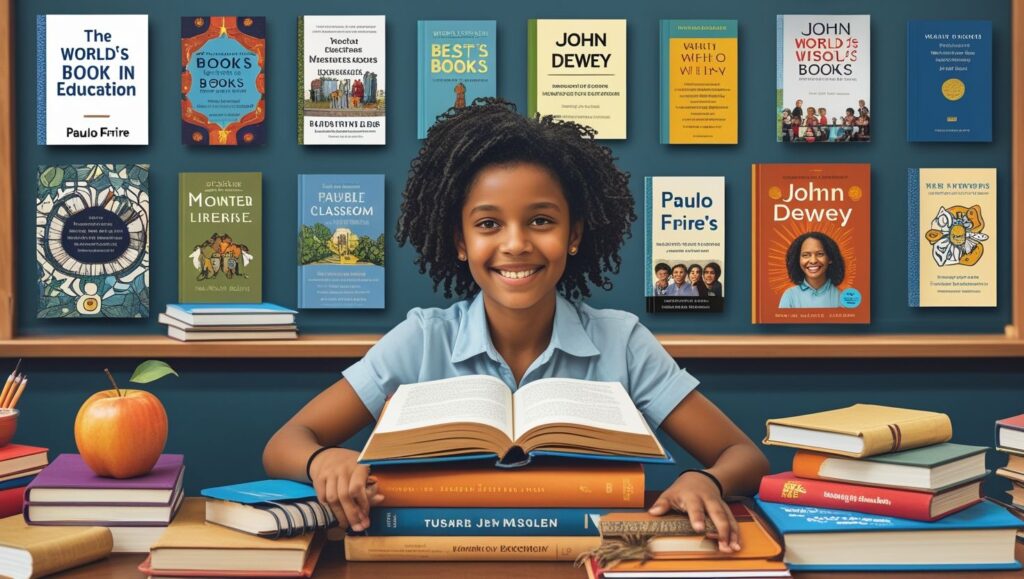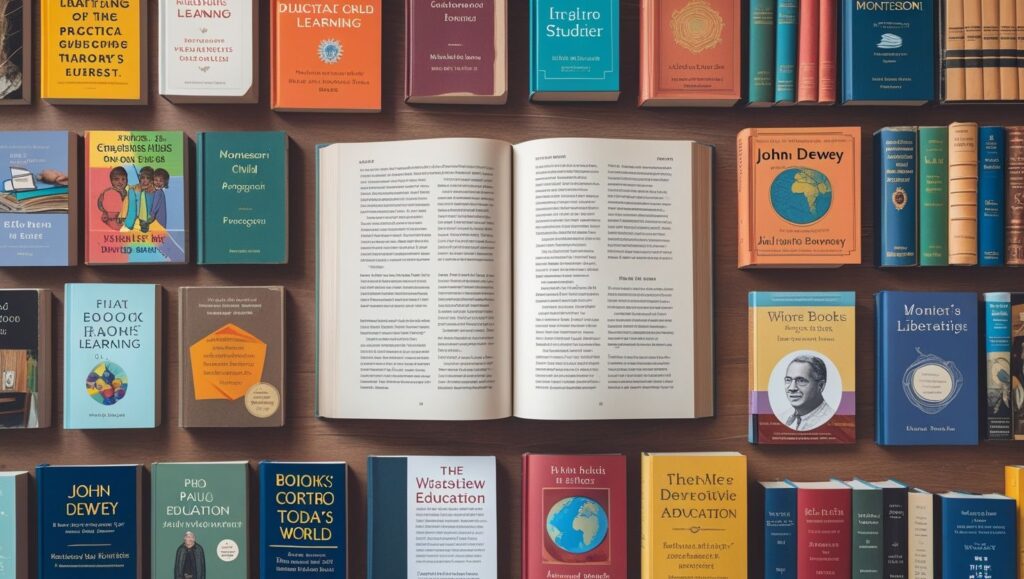Introduction
World’s Best Books Reviews in Education, Education has been shaped by countless thinkers, but certain books in education stand out as timeless guides. These books not only inspire teachers but also transform classrooms and learners. By reviewing the world’s best educational books, we can uncover ideas that remain relevant across generations. Such works explore theories of learning, teaching methods, student motivation, curriculum design, and the philosophy of education. In addition, they provide practical strategies for both educators and learners. Many of these books also challenge traditional practices and open doors to new approaches. Understanding their insights helps educators refine teaching, enhance learning outcomes, and prepare students for a rapidly changing world. Therefore, reviewing these books is not only valuable for professional growth but also for shaping a brighter educational future globally. Clic for downloads
Why Book Reviews in Education Matter
Book reviews in education are vital because they highlight the strengths and weaknesses of influential works. Teachers and researchers often turn to reviews before deciding which book to read or use in their practice. Reviews also summarize complex ideas, making them more accessible to wider audiences. Moreover, they show how books fit into current educational debates. For example, a review may reveal whether a classic text still applies in today’s classrooms or whether it needs reinterpretation. Furthermore, reviews encourage critical thinking by comparing different perspectives. They also help readers connect theory with practical classroom realities. Without reviews, many valuable books could remain underappreciated. Additionally, reviews often generate discussions that shape new teaching approaches. Therefore, reviews serve as a bridge between authors, educators, and learners, making them essential in promoting meaningful education worldwide.
“Pedagogy of the Oppressed” by Paulo Freire
One of the world’s best books in education is Paulo Freire’s Pedagogy of the Oppressed. This book focuses on how education can liberate individuals from oppression. Freire introduces the concept of “banking education,” where teachers deposit information into passive students. Instead, he proposes “problem-posing education,” where dialogue and critical thinking drive learning. This book encourages students to become active participants in their education. Moreover, it highlights the importance of social justice and equity in teaching. Teachers who adopt Freire’s ideas often create classrooms where voices are heard, and perspectives are valued. Importantly, this book is still widely cited in discussions about democratic education. It challenges teachers to move beyond traditional models and empower learners. Because of its global influence, Pedagogy of the Oppressed continues to inspire educators seeking to create more inclusive and transformative learning spaces.
“How Children Fail” by John Holt
Another highly regarded educational book is John Holt’s How Children Fail. This book explores why students often struggle in school. Holt, a teacher himself, analyzed how classroom systems sometimes create fear rather than curiosity. He argued that children fail not because they lack intelligence, but because they are pressured by rigid structures. Instead of promoting exploration, schools often focus too heavily on grades and exams. Holt suggested that real learning happens when students feel safe to experiment, question, and make mistakes. The book has inspired alternative education movements and homeschooling advocates worldwide. Furthermore, it emphasizes the need for teachers to understand the emotions behind learning. Holt’s insights remain relevant in today’s debate about standardized testing. By highlighting student-centered learning, How Children Fail continues to be a key reference for those rethinking traditional education systems.

“Democracy and Education” by John Dewey
John Dewey’s Democracy and Education is a classic that shaped modern educational thought. Dewey believed that education and democracy are deeply connected. He argued that schools should not only transmit knowledge but also prepare students to participate in society. For Dewey, learning by doing was essential. He promoted experiential learning, where students engage with real-world problems. This philosophy transformed schools into spaces for active participation. Dewey also emphasized the importance of community in education. Moreover, he highlighted how education must evolve with social changes. Many modern teaching practices, such as project-based learning, trace their roots to Dewey’s ideas. His book remains a guide for educators seeking to balance knowledge, skills, and civic responsibility. Because of its depth and relevance, Democracy and Education is still studied worldwide and regarded as one of the most influential educational texts.
“The Courage to Teach” by Parker J. Palmer
Parker J. Palmer’s The Courage to Teach is another remarkable contribution to education literature. The book focuses on the inner life of teachers. Palmer argues that good teaching comes not only from technique but from the teacher’s identity and integrity. He encourages educators to embrace vulnerability, authenticity, and passion. This work highlights how teachers must connect with their students beyond academic content. Moreover, it explores the spiritual and emotional dimensions of teaching. Many educators find this book refreshing because it addresses burnout and renews their sense of purpose. Palmer’s perspective emphasizes relationships in education and the courage required to remain true to one’s calling. The book also provides reflective practices that help teachers reconnect with their values. Because of its personal and professional depth, The Courage to Teach remains an essential guide for sustaining meaningful teaching careers.
“Experience and Education” by John Dewey
Another influential book by John Dewey is Experience and Education. In this short but powerful text, Dewey critiques both traditional and progressive education. He argues that learning must be grounded in real experiences but also structured to promote growth. Dewey insists that not all experiences are educational unless they connect meaningfully to future learning. He introduces the concept of continuity, where one experience builds on the next. This balance between freedom and guidance remains relevant in modern classrooms. Teachers often find Dewey’s approach practical because it bridges theory and practice. The book emphasizes that education is not just about content but about cultivating curiosity and habits of inquiry. Furthermore, Dewey’s reflections guide curriculum development even today. As a result, Experience and Education remains a cornerstone for teachers seeking effective and experience-based learning strategies.
“Frames of Mind” by Howard Gardner
Howard Gardner’s Frames of Mind revolutionized the way educators think about intelligence. Published in 1983, this book introduced the theory of multiple intelligences. Gardner challenged the traditional view of intelligence as a single, measurable ability. Instead, he proposed that humans have different kinds of intelligences, such as linguistic, logical-mathematical, musical, bodily-kinesthetic, interpersonal, intrapersonal, and naturalistic. This framework reshaped how teachers approach instruction. Many educators now design lessons that tap into multiple strengths rather than focusing only on academic skills. Moreover, Gardner’s ideas promote inclusivity by recognizing diverse student abilities. Schools worldwide have applied this theory to create more personalized learning. While some critics argue about its scientific basis, the book continues to influence curriculum design and teaching practices. Thus, Frames of Mind stands as one of the most impactful books in the world of educational psychology.
“The Montessori Method” by Maria Montessori
Maria Montessori’s The Montessori Method is a landmark in child-centered education. Montessori believed that children learn best when given freedom in a structured environment. She emphasized hands-on learning, self-directed activity, and collaborative play. Her method focuses on developing independence, concentration, and intrinsic motivation. Montessori classrooms are designed with carefully chosen materials that encourage exploration. Teachers act as guides rather than strict instructors. This approach has spread globally, influencing early childhood education in countless schools. Moreover, Montessori’s philosophy respects the individuality of each child. It also aligns with modern ideas about active learning and student autonomy. While traditional systems sometimes emphasize uniformity, the Montessori method celebrates uniqueness. Because of its effectiveness and adaptability, The Montessori Method remains one of the most respected and widely practiced educational frameworks in the world today.

“The First Days of School” by Harry K. Wong and Rosemary T. Wong
Harry K. Wong and Rosemary T. Wong’s The First Days of School is widely considered essential for teachers. This practical book focuses on classroom management and student engagement. The authors emphasize that the first days of school set the tone for the entire year. They provide concrete strategies for organizing classrooms, establishing routines, and building positive relationships. Teachers especially appreciate the book’s clear, step-by-step guidance. Moreover, it balances theory with practical examples from real classrooms. The book highlights the importance of consistency, preparation, and communication. It also stresses that teachers can create safe environments that encourage learning. Because of its accessibility and usefulness, many teacher training programs recommend this book. Even experienced educators return to it for reminders about foundational practices. As a result, The First Days of School has become a global classic in educational literature.
“Visible Learning” by John Hattie
John Hattie’s Visible Learning is a groundbreaking synthesis of educational research. Hattie analyzed thousands of studies to identify what really works in education. The book presents a list of factors ranked by their impact on student achievement. This evidence-based approach has changed how schools evaluate teaching practices. For instance, feedback, teacher-student relationships, and formative assessment rank highly. On the other hand, some popular methods show limited effectiveness. Teachers and policymakers use this book to make informed decisions. Moreover, it bridges the gap between theory and practice by grounding claims in data. Visible Learning also encourages educators to focus on what has the greatest effect. Its clear presentation of research findings makes it a must-read for both new and experienced teachers. Ultimately, this book empowers educators to apply strategies that maximize student success.
Conclusion: Lessons from the World’s Best Educational Books
The world’s best books in education provide timeless wisdom and practical tools. From Freire’s call for liberation to Montessori’s focus on child-centered learning, these works cover a wide range of perspectives. Dewey emphasized democracy and experience, while Gardner broadened our understanding of intelligence. Holt challenged traditional school systems, and Palmer spoke to the heart of teaching. Meanwhile, Wong and Hattie offered practical strategies supported by research. Together, these books remind us that education is not one-dimensional but a dynamic process. Furthermore, they inspire continuous reflection and innovation. Educators who engage with these works gain valuable insights into how to teach, how to learn, and how to shape a better society. Therefore, reviewing these books helps us not only honor their impact but also apply their lessons to today’s classrooms and beyond.
References
- Freire, P. (1970). Pedagogy of the Oppressed. Continuum International Publishing.
- Dewey, J. (1916). Democracy and Education. Macmillan.
- Gardner, H. (1983). Frames of Mind: The Theory of Multiple Intelligences. Basic Books.
- Palmer, P. J. (1998). The Courage to Teach: Exploring the Inner Landscape of a Teacher’s Life. Jossey-Bass.

Very interesting subject, thanks for putting up.
**balmorex**
balmorex is an exceptional solution for individuals who suffer from chronic joint pain and muscle aches.